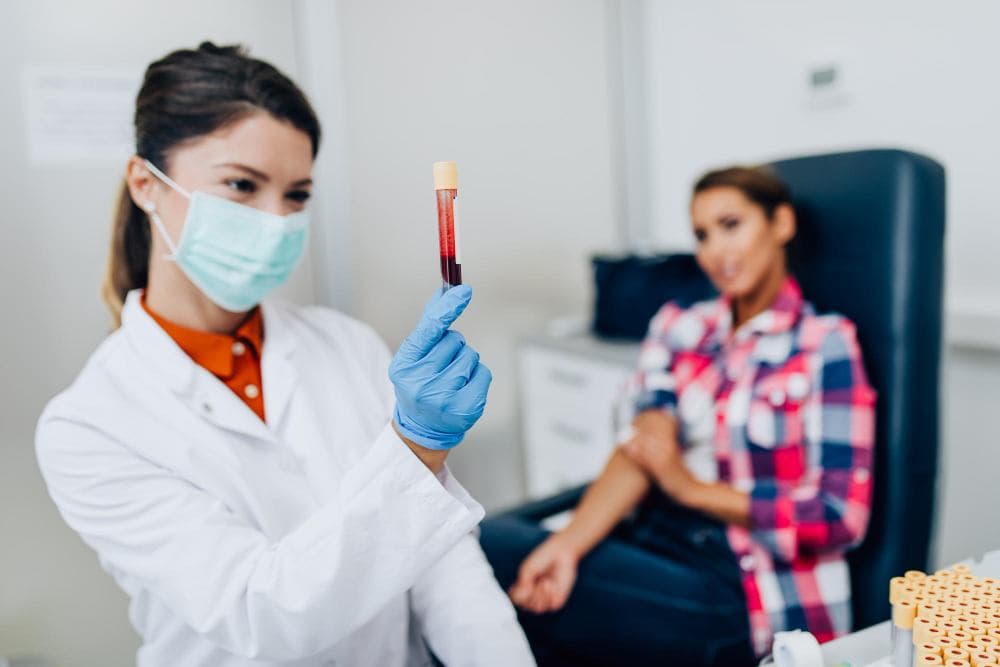Blood Tests for Pregnancy: Understanding Key Markers

Medically Reviewed By
Dr. Ragiinii Sharma
Written By Kirti Saxena
on Feb 3, 2024
Last Edit Made By Kirti Saxena
on Mar 17, 2024

Congratulations on embarking on the beautiful journey of pregnancy! From the early stages of conception to the final countdown, blood tests for pregnancy play a pivotal role in monitoring your pregnancy and ensuring a smooth and healthy experience for you and your little one. Blood tests for pregnancy are not only important but also empowering. These tests enable you to make informed decisions, receive timely treatment, and ensure the best growing environment for your baby's development.
By examining various markers, these tests shed light on crucial aspects such as hormone levels, genetic screenings, immune system health, and nutrient status. Blood tests during pregnancy provide a comprehensive snapshot of your body's functioning and help medical practitioners identify and prevent potential risk factors and complications.
This blog will help you know the important blood tests for pregnancy that will promote a healthy pregnancy.
What are the common symptoms of pregnancy?
Pregnancy is one of the most magical experiences a woman can go through. However, it comes with a unique set of physical and emotional changes that leave pregnant mothers excited and overwhelmed. Here are some common symptoms of pregnancy.
- Missed period: One of the most common early signs of pregnancy is a missed menstrual period. However, some women might experience light bleeding or spotting even during pregnancy.
- Nausea and vomiting: Another common symptom is morning sickness, which is not just limited to mornings, as it can strike at any time of the day. Usually, it starts around the 6th week due to hormonal fluctuations.
- Fatigue: Feeling more tired than usual is normal during pregnancy, especially during the first and third trimesters. Take it easy and get the rest you need.
- Breast changes: The breasts become tender, swollen, or more sensitive. The nipples may also darken in color. However, do not worry; these changes are all part of your body's preparation for breastfeeding.
- Frequent urination: Increased blood flow to the kidneys and hormonal changes can lead to more frequent trips to the bathroom.
- Food cravings: Some women may have strong cravings for certain foods, while others may develop aversions to foods they previously enjoyed.
- Mood swings: Hormonal fluctuations during pregnancy may cause emotional changes and mood swings.
- Dizziness or fainting: Changes in blood pressure and blood sugar levels can lead to occasional dizziness or fainting spells, which are common.
- Constipation: Hormonal changes and pressure from the growing uterus can slow digestion, leading to constipation.
- Abdominal bloating: Some women may experience bloating and mild cramping similar to premenstrual symptoms.
Growing a tiny human is no easy feat; your body knows it. So, it is important to notice these symptoms and consult your doctor. Take blood tests from Redcliffe labs to confirm pregnancy and get proper evaluation and guidance.
How many Blood tests for Pregnancy?
During pregnancy, a woman may undergo several blood tests to monitor her health and the baby's development. Here are some common blood tests during pregnancy week by week must be done during pregnancy:
Early Pregnancy Blood Tests
- Urine Pregnancy Test: This test is commonly used to detect the initial screening for pregnancy and can be performed at home. The urine sample is tested in a pregnancy kit to check for hCG levels.
- hCG Test: The hCG blood test measures the hCG hormone levels in a pregnant woman's blood. This test is more sensitive than the urine test and can detect pregnancy at an earlier stage.
- Progesterone Levels: This blood test measures the progesterone levels in the blood. Low progesterone levels indicate a high risk for pregnancy complications, such as miscarriage or ectopic pregnancy.
- Complete Blood Count (CBC): During pregnancy, a CBC can help identify common causes of problems, such as anemia.
- Rubella Immunity Test: The Rubella immunity test helps identify if a woman is immune to Rubella or needs vaccination before conceiving.
First Trimester Blood Tests
- Thyroid Function Test: During pregnancy, the thyroid hormone levels may fluctuate or imbalances that may cause severe complications. This test helps monitor TSH Levels and detect and manage related issues on time.
- Pregnancy Associated Plasma Protein-A (PAPP-A) Test: This test is performed as part of prenatal screening. PAPP-A is a protein produced by the placenta, and its levels in the maternal blood provide information on developing fetal health. Abnormal PAPP-A levels show a high risk of pregnancy difficulties.
- Double Marker Test: This test combines two blood tests, usually diagnosing certain chromosomal abnormalities, such as Down syndrome (Trisomy 21) and Edwards syndrome (Trisomy 18). The test measures the levels of (hCG) and (PAPP-A). Abnormal levels of these markers may raise concerns about potential fetal chromosomal abnormalities.
Second Trimester Blood Tests
- Glucose Challenge Test: This test is performed to screen for gestational diabetes, commonly found in pregnant women, causing high blood sugar levels.
- Alpha-Fetoprotein (AFP) Maternal Marker Test: The Alpha-Fetoprotein (AFP) Maternal Marker Test is a blood test performed during prenatal screening. AFP is a protein that helps to develop the baby's liver. Abnormal AFP levels might increase the risk of certain congenital disabilities, such as neural tube defects.
- Triple Marker Test: The test measures the three substances in the maternal blood: AFP, hCG, and unconjugated estriol. These markers, along with maternal age and other factors, help assess the risk of certain chromosomal abnormalities, particularly Down syndrome (Trisomy 21), Edwards syndrome (Trisomy 18), and other congenital disabilities.
- Quadruple Marker Test: The Quadruple Marker Test is similar to the Triple Marker Test. It measures the AFP, hCG, unconjugated estriol, and inhibin A. This test assesses the risk for chromosomal abnormalities and other genetic disabilities, including Down syndrome and neural tube defects.
Third Trimester Blood Tests
- Surface Antigen (HBsAg) Test: This blood test for pregnancy is performed to check for the presence of the Hepatitis B virus. If the test results are positive, your doctor will advise you to take some necessary precautions to prevent transmission to the baby.
- Syphilis Screening: The test detects the bacterium causing syphilis. Early detection will allow timely treatment to prevent complications and protect the mother and baby.
- HIV Screening: This test identifies the Human Immunodeficiency Virus. Early diagnosis enables proper medical care to reduce the risk of transmission to the baby and ensure a healthier pregnancy.
Other Important Blood Tests for Pregnancy
- Streptococcus Group B Antigen, Serum Test: This blood test checks the presence of Group B Streptococcus (GBS) bacteria. If a pregnant woman carries GBS, there is a risk of transmitting it to the baby during childbirth, which can cause serious infections.
- Toxoplasma IgG Avidity Test: The Toxoplasma IgG Avidity Test is a blood test that determines the level of Toxoplasma gondii antibodies in a pregnant woman's blood.
- HCG Tumor Marker (Cancer) Test: The HCG Tumor Marker Test measures the levels of human chorionic gonadotropin (HCG) in the blood. HCG is a hormone produced during pregnancy, but certain types of cancer, such as testicular or ovarian cancer, can also produce HCG.
- HIV Antibody Test: The HIV Antibody Test is a blood test used to detect the presence of antibodies to the Human Immunodeficiency Virus (HIV). The risk is high of transmitting the virus to the baby during pregnancy, childbirth, or breastfeeding.
- Antenatal Care Profile (ANC) Test: This blood test is performed during early pregnancy to assess the health of the mother and the developing fetus. The tests in the ANC profile may include blood group and Rh factor, hemoglobin levels, blood glucose levels, hepatitis B, syphilis, HIV, and urine analysis.
Blood tests for pregnancy must be performed under the guidance of your doctor or labs. These pregnancy blood tests are important as they ensure the mother's and baby's health and well-being. These pregnancy blood tests will help you identify the risks or complications in the early stages. Get tested with Redcliffe Labs, as they will provide world-class facilities and comfort to get tested from home.
Tips for Healthy Pregnancy
Maintaining a healthy pregnancy is necessary for the well-being of both the mother and the baby. Here are some valuable tips to promote a healthy and safe pregnancy:
- Healthy Diet- Eat nutritious food that helps your baby grow. Take food rich in iodine, folate, iron, protein, calcium, vitamin D, and B12, and stay hydrated.
- Exercise regularly: Staying active helps you prepare for labor, mood swings, stress, energy levels, and recovery. Exercise regularly for at least 40 to 60 minutes.
- Avoid smoking and alcohol: Say no to smoking, alcohol, and other drugs, as it harms your baby's development and health.
- Limit caffeine: High intake of caffeine has adverse pregnancy results.
- Get enough rest: Sleep 7-9 hours, as it promotes recovery and supports the baby's growth.
- Practice good hygiene: Wash hands regularly and avoid contact with sick people.
- Regular prenatal care: Schedule regular check-ups with a healthcare provider throughout pregnancy.
- Stay informed: Educate yourself about pregnancy, childbirth, and postpartum care, and prepare for labor and breastfeeding.
Remember that every pregnancy is different, and it is important to consult with a medical practitioner to get personalized advice and care throughout this journey.


